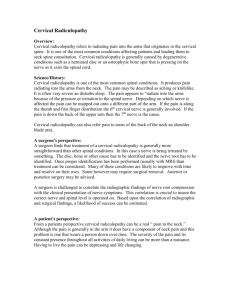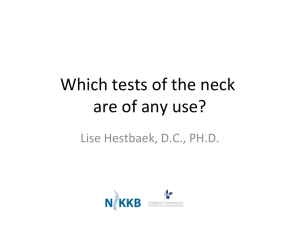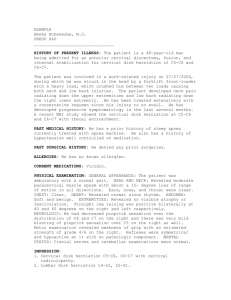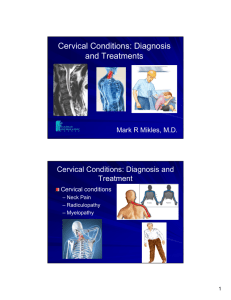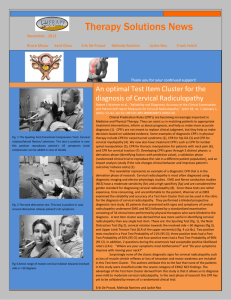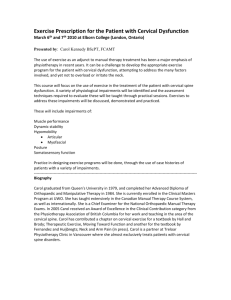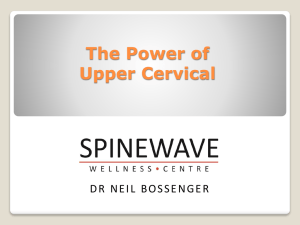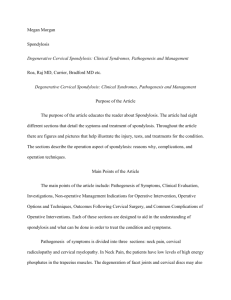ASM Speaker Ms Louise Keating
advertisement
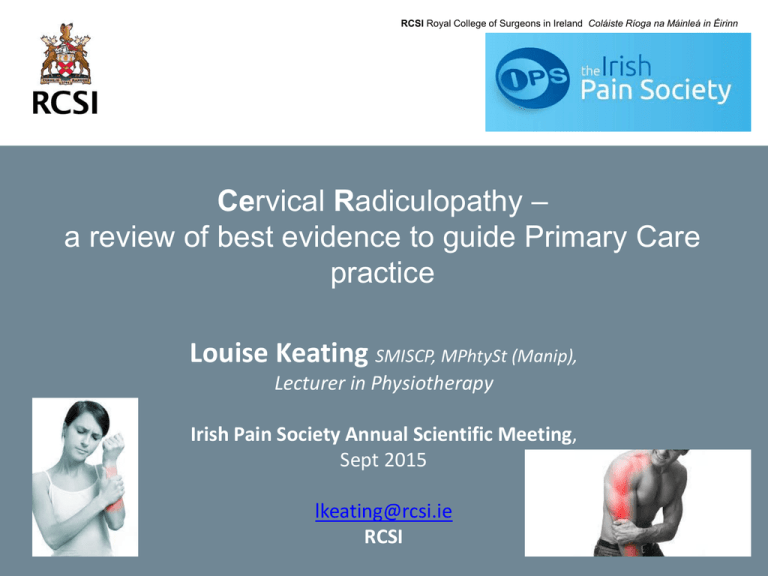
RCSI Royal College of Surgeons in Ireland Coláiste Ríoga na Máinleá in Éirinn Cervical Radiculopathy – a review of best evidence to guide Primary Care practice Enter subtitle hereSMISCP, (24pt, Arial Regular) Louise Keating MPhtySt (Manip), Enter date: 25.06.13 Lecturer in Physiotherapy Irish Pain Society Annual Scientific Meeting, Sept 2015 lkeating@rcsi.ie RCSI Outline – Epidemiology – Natural history – Global Clinical Practice – Best Evidence – Assessment in Primary care – Conservative management – Outcome predictors – Surgical management – Indications for referral – Outcome predictors – Research gap Definition • • Pain in a radicular pattern in one or both upper extremities related to compression and/or irritation of one or more cervical nerve roots. Frequent signs and symptoms include varying degrees of sensory, motor and reflex changes as well as dysesthesias and paresthesias related to nerve root(s) without evidence of spinal cord dysfunction (myelopathy) NASS Work Group Consensus Statement (2011) • Radiating pain in the arm with motor, reflex and/or sensory changes (such as paraesthesiae or numbness), provoked by neck posture(s) and /or movement(s) Thoomes et al (2012) Peripheral NeuP Pain • IASP definition Pain caused by a lesion or disease of the peripheral somatosensory nervous system Jensen et al 2011 • In developed countries, most frequent causes • Diabetic Polyneuropathy and • Radiculopathies with neuropathic pain components Haanpaa et al 2009 NeuP Pain Cx Rad Most common Reasons for non-dermatomal pain patterns Schmid et al 2013 Inclusion Criteria Variability Aetiology 75% 25% 25% Soft Disc • Single level • Inflammation: – Interleukins & Prostaglandin • Majority spontaneously resolve (weeks – months) 75% Spondylosis • Uncovertebral joint degeneration • Multiple levels common Natural History • 88% CR patients show improvement within 4/52 Alentado et al 2014 • 90% have no or mild symptoms after 4-5yrs – 20% did not improve surgery Radhakrishan et al 1994 • Deg CR - Arm pain VAS 7 5 in 6/52 • Recurrence – 12.5% in 1-2yrs Kuijper et al 2009 Honet & Puri 1976 Limited studies supporting any optimal duration of conservative treatment prior to surgery evidence-based conclusions cannot be made Alentado et al 2014 Traditional failure of 6/52 conservative management escalation Background • WHO Bone & Joint Decade Taskforce on Neck Pain – Research Gap exists in CR Hurwitz et al 2008 – Higher levels of pain, disability & healthcare costs Haldeman et al 2008 • Axial neck pain • Chronic non-neuropathic pain Recommendations for Assessment Chronic NeuP in Primary Care - NeuPSIG • Consensus on Diagnostic processes – Categorisation of Pain mechanism Neuropathic / Nociceptive pain – Sensory tests: Touch, pinprick, thermal & vibration – Identify Underlying cause • Pivotal role for GPs – Early identification & Management – Triage for appropriate Rx strand • Mixed Pain – Lack of response to Nociceptive analgesics Neuropathic pain may be primary Haanpaa et al 2009 Screening Tools • • • • LANSS S-LANSS painDETECT* DN4 QST for Cervical Radiculopathy - PPT Symptom Maximal Derm area Nerve trunks duration Pain Area sensory loss (kPa) (kPa) (kPa) Articular pillar -C5/6 (kPa) Remote site -Tib Ant (kPa) Chien et al 2008 (n=38) Mean 19.7 mos. +/- 14.2 Median N – 203 199 440 (95% CI 179-228) (95% CI 173226) (95% CI 378-503) Moloney et al 2013 (n=17) Mean 4.9 yrs +/- 6.2 Median N – 161 381 (172) (IQR 135) Ulnar N – 223 (148) Radial N – 217 (155) Tampin et al 2013 (n=23) 3-18 mos. 403 vs. 434 (asymp) 572 vs. 492 (asymp) QST in the German Research Network on Neuropathic Pain (DFNS): Somatosensory abnormalities in 1236 patients with different neuropathic pain syndromes. (n=15 radiculopathy) Maier et al, Pain; 150 (2010) 439-450 QST for Cervical Radiculopathy - PPT • Profile of altered mechanosensitivity previously found in WAD has also been identified in patients with chronic CR • More gain vs. loss noted Chien et al 2008 • More loss vs. gain noted Tampin et al 2013 • CR research to date has not used PPT as outcome Clinical Prediction Rule • Diagnostic criteria: Cluster of four items (3/4) 1. Positive ULNT1 2. Positive Spurling’s A test 3. Limited cervical rotation to affected side (<60degs) 4. Positive distraction test • LR Point estimates: – 3 tests = 6.1 (95% CI 2.018.6) – 4 tests = 30.3 (95% CI 1.7538.2) Wainner et al 2003 Global Clinical Practice NeuPSIG Pharma Recommendations Finnerup et al 2015 NICE Guidelines NeuP pain Pharma Mgmt adults in non-specialist settings 2013 • First Line - choice of Amitriptyline, Duloxetine, Gabapentin or Pregabalin • If the initial treatment is not effective or is not tolerated, offer one of the remaining 3 drugs, and repeat. • Consider tramadol only if acute rescue therapy is needed • Consider capsaicin cream for people with localised neuropathic pain who wish to avoid, or who cannot tolerate, oral treatments. • NICE Pathway for NeuP pain (2015) MSK Physiotherapy Practice Nee et al 2013 Rank Treatment Options Type 1 Explanation & Advice 2 Exercise Motor Control Muscle Strength & Endurance ROM 3 Passive manual therapy Joint Mobilisation (not manipulation) 4 Nerve gliding exercises 5 Stretching Neck and Axioscapular muscles 6 Taping Neck & Shoulder 7 Thermal agents Heat > Cold 8 Traction Manual not mechanical / home 9 Prescription HEP Conservative Management (non-invasive and non-pharma) • Cohort studies – Initially promising results Saal et al 1996, Murphy et al 2006 • Clinical Trials – Persson et al 1997, Young et al 2009, Joghataei et al 2004, Kuijper et al 2009, Langevin et al 2014, Fritz et al 2014 • Systematic Reviews – Manual therapy • Cochrane – no conclusions • No conclusions due to low quality trials • MT and Ex benefits chronic CR Gross et al 2010 Leininger et al 2011 Boyles et al 2011 – Conservative Rx • Collar or Physiotherapy show promising short-term results Thoomes et al 2013 0-12 weeks • Systematic Review – Cochrane RV Exercise: low quality evidence for small benefit for pain reduction immediate post treatment with cervical stretch / strengthening / stabilization in acute CR Gross et al 2015 • Clinical Trials emerging (Dose: 4-6/52) – Manual Therapy + Exercise + Postural Advice + Pharma (analgesics, NSAIDs, steroids or anti-depressants) (n=36) Langevin et al 2014 – Exercise + Advice + Pharma (Paracetamol, NSAIDs or Opioids) (n=205) Kuijper et al 2009 • Rationale for early intervention – Nerve unloading: irritation vs. compression Manual therapy (non-provocative) – Lateral Glide causes immediate change to ULNT 1 & NPRS • Coppieters et al 2003 Langevin et al (2014) Results – both groups received varied manual therapy & exercise no true control to measure natural hx. Arm Pain Langevin et al 2015 n=36 Baseline Kuijper et al 2009 n=205 4 wks Fritz et al 2014 n=86 6 mo 12 mo Neck Pain Langevin et al 2015 n=36 Baseline Kuijper et al 2009 n=205 4 wks Fritz et al 2014 n=86 6 mo 12 mo Neck Disability Index Langevin et al 2015 n=36 Cervical Collar Physio Control Baseline 41 (17.6) 45.1 (17.4) 39.8 (18.4) 3 wks 33.8 (18.7) 34.6 (16.1) 34.3 (18.8) 6 wks 25.9 (19.1) 27.8 (17.7) 29.9 (20) 26 wks 8 10 8 Baseline Kuijper et al 2009 n=205 4 wks Fritz et al 2014 n=86 6 mo 12 mo Predictors of good response to Physiotherapy • 4 variable model - at 4/52 – age greater than 54 years, – non-dominant arm, – cervical flexion not aggravating symptoms, – Multimodal Physiotherapy: MT, cervical traction and DNF strengthening at half of clinical visit • + LR ratio 8.3 (95% CI = 1.9-63.9) Cleland et al 2007 Surgery vs. Conservative Rx Systematic Review - Cochrane – Surgery leads to faster improvement in pain and disability at 3/12 vs. conservative management for chronic CR – Similar outcomes at 1 yr Nikolaidis et al 2010 RCT – Physio vs. Surgery + Physio – no additional benefit from surgery Peolsson et al 2013 Protocol – CASINO Trial currently recruiting CR (disc) – Surgery vs. GP care (n=400) van Geest et al 2014 Surgical Review Criteria for CR Best evidence synthesis • Sensory symptoms (radicular pain and/or paraesthesia) in dermatome corresponding to involved cervical level AND • Motor deficit OR reflex changes OR positive EMG AND • MRI OR Myelogram with CT – concordant AND • At least 6/52 of conservative Rx – Exception = clear motor deficit after acute injury Leveque et al 2015 Surgical Review Criteria for CR – Best evidence synthesis • Sensory symptoms (radicular pain and/or paraesthesia) in dermatome corresponding to involved cervical level AND • Positive response (80% improvement or 5 VAS pts) to Selective Nerve Root Block (SNRB) Leveque et al 2015 NHS National Pathway of Care for Low Back & Radicular Pain 2014 Radicular Pathway Predictors of Surgical Outcome SHORT-TERM (1-2 yrs) • Lower levels pre-op pain and disability • Male • Non-smoker • Good hand strength & neck AROM Not MRI findings Peolsson & Peolsson 2008 LONG-TERM (10-13 yrs) • Higher levels pre-op pain • Male • Non-smoker • Low level depression Hermansen et al 2013 Biopsychosocial assessment is suggested pre-surgery Research Gaps • Primary Care practice patterns in Ireland – Pharmacology – Surgical referral – Pain Specialist referral • 0-12 weeks – RCTs needed: MMT + Pharma vs. Pharma • Sub-group responders – Somatosensory & biopsychosocial profile • Surgery • Recurrence – Lack of guidance for secondary prevention Key Messages Best evidence Approach • Assessment: • History taking for arm pain vs. neck pain, • Categorise pain mechanisms (screening tools) and aetiology (MRI) • Sensory testing • Diagnosis – CPR to rule in (MRI to confirm) and ULNT1 to rule out • Self-report outcome measures – VAS (neck & arm), NDI Key Messages Best evidence Approach • Conservative Rx: • Reassurance • Pharmacology – high level of evidence • 0-12 weeks – RCT evidence has not yet established efficacy of MMT vs. time. Exercise (/ collar) has efficacy in spondylotic CR. • > 12 weeks - Multimodal PT more evidence • Surgical Referral: Major motor radiculopathy, suspected myelopathy, failure of 6/52 Cons Rx, patient profile (nontolerable pain) RCT of Multimodal Physiotherapy for Acute or Sub-Acute Cervical Radiculopathy www.rcsi.ie/PACeRtrial Prof. Ciaran Bolger, Consultant Neurosurgeon, Beaumont Hosp Dr. Dara Meldrum, RCSI Dr. Catherine Doody, UCD, Caroline Treanor, Clinical Specialist Physiotherapist, Julie Sugrue, Senior Physiotherapist, Beaumont Hosp @UqLouise References • • • • • • • • • • • • • BONO, C. M., GHISELLI, G., GILBERT, T. J., KREINER, D. S., REITMAN, C., SUMMERS, J. T., BAISDEN, J. L., EASA, J., FERNAND, R., LAMER, T., MATZ, P. G., MAZANEC, D. J., RESNICK, D. K., SHAFFER, W. O., SHARMA, A. K., TIMMONS, R. B. & TOTON, J. F. 2011. An evidence-based clinical guideline for the diagnosis and treatment of cervical radiculopathy from degenerative disorders. Spine J, 11, 64-72. BOYLES, R., TOY, P., MELLON, J., JR., HAYES, M. & HAMMER, B. 2011. Effectiveness of manual physical therapy in the treatment of cervical radiculopathy: a systematic review. J Man Manip Ther, 19, 135-42. CHIEN, A., ELIAV, E. & STERLING, M. 2008. Whiplash (Grade II) and Cervical Radiculopathy Share a Similar Sensory Presentation: An Investigation Using Quantitative Sensory Testing. The Clinical Journal of Pain, 24, 595-603 10.1097/AJP.0b013e31816ed4fc. FOUYAS, I., SANDERCOCK, P, STATHAM P, NIKOLAIDIS, I 2010. How beneficial is surgery for cervical radiculopathy and myelopathy? BMJ, 341. HALDEMAN, S., CARROLL, L., CASSIDY, J., SCHUBERT, J. & NYGREN, A. 2008. The Bone and Joint Decade 2000–2010 Task Force on Neck Pain and Its Associated Disorders - Executive Summary. Spine (Phila Pa 197), 633, S5-7. HURWITZ, E. L., CARRAGEE, E. J., VELDE, G., CARROLL, L. J., NORDIN, M., GUZMAN, J., PELOSO, P. M., HOLM, L. W., CÔTÉ, P., HOGG-JOHNSON, S., CASSIDY, J. D. & HALDEMAN, S. 2008. Treatment of Neck Pain: Noninvasive Interventions. European Spine Journal, 17, 123-152. NIKOLAIDIS, I., FOUYAS, I., SANDERCOCK PAG & PF, S. 2010. Surgery for cervical radiculopathy or myelopathy. Cochrane Database Syst Rev. KAY, T. M., GROSS, A., GOLDSMITH, C. H., RUTHERFORD, S., VOTH, S., HOVING, J. L., BRONFORT, G. & SANTAGUIDA, P. L. 2012. Exercises for mechanical neck disorders. Cochrane Database Syst Rev, 8, CD004250. LANGEVIN, P., DESMEULES, F., LAMOTHE, M., ROBITAILLE, S, & ROY, J. S. 2015. Comparison of 2 Manual Therapy and Exercise Protocols for Cervical Radiculopathy: A Randomized Clinical Trial Evaluating Short-Term Effects. J Orthop Sports Phys Ther ;45(1):4-17. Epub 24 Nov 2014. doi:10.2519/jospt.2015.5211 LANGEVIN, P., ROY, J. S. & DESMEULES, F. 2012. Cervical radiculopathy: study protocol of a randomised clinical trial evaluating the effect of mobilisations and exercises targeting the opening of intervertebral foramen [NCT01500044]. BMC Musculoskelet Disord, 13, 10. PEOLSSON, A., SODERLAND, A. & ENGQUIST, M. 2013. Physical function outcome in cervical radiculopathy patients after physiotherapy alone compared with anterior surgery followed by physiotherapy. A prospective randomized study with a 2-year follow-up. Spine (Phila Pa 1976), 38, 300-307. RADHAKRISHNAN, K., LITCHY WJ, O’ FALLON WM & LT., K. 1994. Epidemiology of cervical radiculopathy. A population-based study from Rochester, Minnesota, 1976 through 1990. Brain, 117, 325-35. WAINNER, R. S., FRITZ, J. M., IRRGANG, J. J., BONINGER, M. L., DELITTO, A. & ALLISON, S. 2003. Reliability and diagnostic accuracy of the clinical examination and patient self-report measures for cervical radiculopathy. Spine (Phila Pa 1976), 28, 52-62. Full list available on request Lkeating@rcsi.ie
